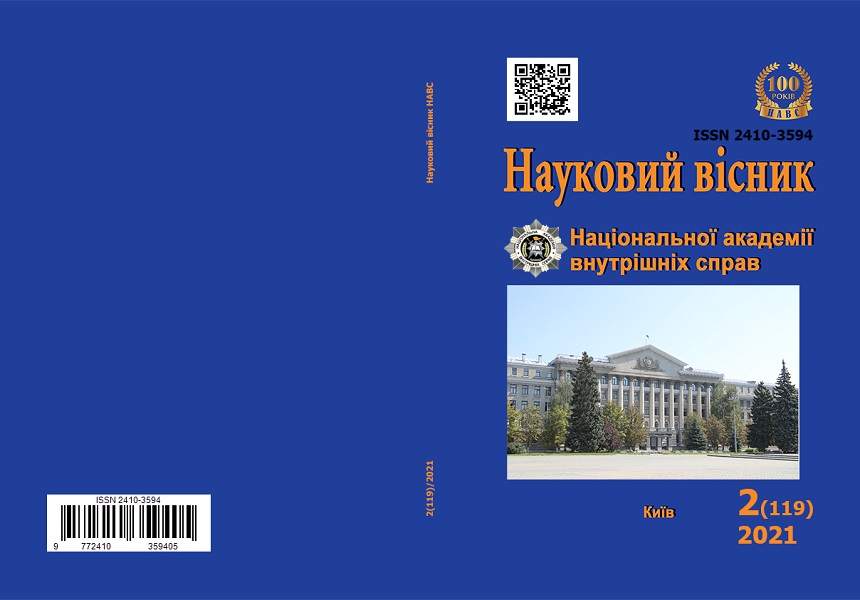Signs of the Subject of the Provocation of Bribery: Some Issues of Qualification and Law Enforcement
Abstract
The purpose of the research paper is to conduct critical analysis of the elements of subject of bribery provocation in the context of legal assessment and practical application of Art. 370 of the Criminal Code of Ukraine. Methodology. The following methods of scientific cognition have been used in the article in a complex mode: historical, terminological, system-structural, formal-logical. Scientific novelty. Based on the comprehensive legal analysis of the characteristics of the subject of the crime under Art. 370 of the Criminal Code, including by referring to the history of regulation and analysis of developments in the relevant direction of law enforcement practice, the author's position that the current version of the norm on provocation of bribery should abandon the elements of a special subject of this crime (official) in favor of general subject have been expressed and argued. Conclusions. It has been proposed to include in Part 1 of the updated construction of the criminal law prohibition on bribery provocation the elements of the general subject of bribery provocation, and in Part 2 of the relevant article to include references to a special entity – a law enforcement official. From the de lege ferenda standpoint it has been substantiated that in the text of Part 2 of Art. 370 of the Criminal Code, the subject element «law enforcement officer» should be replaced by a more appropriate «law enforcement officer». Also, based on the results of elaboration of the relevant area of law enforcement practice, a proposal was made to develop improved substantive criteria for identifying elements of inadmissible provocation in the actions of authorized law enforcement officers.
Keywords: bribery provocation; special subject of crime; law enforcement officer; law enforcement practice; judicial practice.
Downloads
References
Альошина О. І. Провокація злочину (кримінально-правове дослідження) : дис. … канд. юрид. наук : 12.00.08. Харків, 2007. 204 с.
Чернявський С. C., Вознюк А. А. Зарубіжний досвід правової протидії незаконному збагаченню. Юридичний часопис Національної академії внутрішніх справ. 2019. № 1 (17). С. 79–89. doi: https://doi.org/10.33270/04191701.79.
Провокація вчинення злочину: практика ЄСПЛ та національних судів : наук.-практ. посіб. / [О. З. Гладун, В. П. Плотнікова, К. К. Арушанян та ін.]. Київ : Нац. акад. прокуратури України, 2019. 101 с.
Грудзур О. М. Кримінально-правова характеристика провокації хабара : дис. … канд. юрид. наук : 12.00.08. Київ, 2011. 229 с.
Гуйван П. Д. До питання про кваліфікацію провокації підкупу: європейський досвід. Вчені записки Таврійського національного університету імені В. І. Вернадського. 2019. Т. 30. № 1. С. 87–92. (Серія «Юридичні науки»).
Картавцев В. С., Томчук І. О., Притула С. А. Кримінально-правовий аналіз провокації підкупу за законодавством України та зарубіжних країн. Право і суспільство. 2020. № 4. С. 227–235. doi: https://doi.org/10.32842/2078-3736/2020.4.33.
Настільна книга детектива, прокурора, судді: коментар антикорупційного законодавства / за ред. М. І. Хавронюка. Київ : Дакор, 2016. 496 с.
Кваша О. О. Співучасть у злочині: структура та відповідальність : монографія. Луганськ : РВВ ЛДУВС ім. Е. О. Дідоренка, 2013. 560 с.
Шепотько М. А. Щодо встановлення сутності провокації підкупу. Право і суспільство. 2021. № 1. С. 204–210. doi: https://doi.org/10.32842/2078-3736/2021.1.32.
Sviderskyi O., Lubentsov A. The Impact of Corruption on the Development of Legal and Economic Systems of State. Baltic Journal of Economic Studies. 2020. № 1 (6). С. 125–129. doi: https://doi.org/10.30525/2256-0742/2020-6-1-125-129.
Ус О. В. Кримінальна відповідальність за підбурювання до злочину : дис. ... канд. юрид. наук : 12.00.08. Харків, 2005. 227 с.
Ус О. В. Провокація підкупу: аналіз складу злочину й питання кваліфікації. Науковий вісник Міжнародного гуманітарного університету. 2015. № 16. Т. 2. С. 66–70. (Серія «Юриспруденція»).
Веретянніков В. О. Правозастосовне тлумачення провокації кримінального правопорушення в практиці Європейського суду з прав людини (в контексті ч. 1 ст. 6 Конвенції про захист прав людини і основоположних свобод). Вісник Луганського державного університету внутрішніх справ імені Е. О. Дідоренка. 2020. Вип. 4 (92). С. 93–104. doi: 10.33766/2524-0323.92.93-104.
Вознюк А. А. Психологічні теорії пояснення корупції. Юридична психологія. № 2 (25). 2019. С. 7–15. doi: https://doi.org/10.33270/03192502.7.
Вознюк А. А. Корупційні кримінальні правопорушення: концептуальні проблеми реформування кримінального законодавства України. Юридичний часопис Національної академії внутрішніх справ. 2020. № 2 (20). С. 21–32. doi: https://doi.org/10.33270/04202002.21.
Вирок Глухівського міськрайонного суду Сумської області від 28 верес. 2018 р. Справа № 576/1837/17. URL: https://reyestr.court.gov.ua/Review/76792196.
Вирок Придніпровського районного суду м. Черкаси від 1 квіт. 2021 р. Cправа № 711/8004/13-к. URL: https://reyestr.court.gov.ua/Review/95949637.
Вирок Смілянського міськрайонного суду Черкаської області від 21 серп. 2017 р. Справа № 712/1824/16-к. URL: https://reyestr.court.gov.ua/Review/68383908.
Судова практика в справах про злочини у сфері службової діяльності та професійної діяльності, пов’язаної з наданням публічних послуг : окремі тенденції, проблеми та перспективи вдосконалення / наук. ред. К. П. Задоя. Київ : Аграр Медіа Груп, 2014. 135 с.
Abstract views: 245 PDF Downloads: 94
- Authors reserve the right to authorship of their own work and transfer to the magazine the right of the first publication of this work under the terms of the Creative Commons Attribution License, which allows other persons to freely distribute published work with mandatory reference to authors of the original work and the first publication of an article in this magazine.
- Authors have the right to enter into separate additional agreements on non-exclusive dissemination of the work in the form in which it was published in the journal (for example, to post an article in the institution's repository or to publish as part of a monograph), provided that the link to the first publication of the work in this journal is maintained.
- The journal's policy allows and encourages the posting of articles by authors on the Internet (for example, in electronic storehouses of institutions or on personal websites), both before the submission of this manuscript to the editorial office and during its editorial processing, as this contributes to the creation of a productive scientific discussion and positively affects the efficiency and dynamics of citing the published work.




